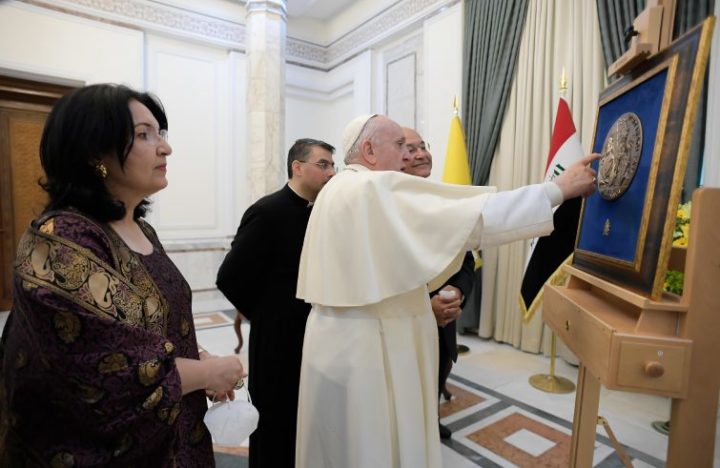The Pope’s decision to visit Mesopotamia must be carefully considered, given the complexity of the geopolitical issues of the Near and Middle East.
The Pope went to a place that is the scene of a geopolitical clash, where there are armies of foreign powers loathed by the local populations, where the transnational terrorism is commonplace and the harsh fights between different clans are often supported by large, medium, small and very small international actors. Nevertheless, the head of the Vatican State made this important visit.
After the media euphoria and after many things have been said and many comments have been made about his trip, I would like to draw attention to an aspect related to the pronouncements of the Pope during the different stages of his visit. This is a political issue and concerns criticism about the practice of war as the main cause of the serious conditions in which many of the world’s peoples live. The Pope has repeatedly stressed that war is an act of oppression. Iraq is a clear and dramatic demonstration of this. A strategic country, not only rich in raw materials, but also in human resources and in an immense historical and cultural heritage has suffered two wars unleashed on the basis of glaring and ignoble lies, like the story of babies in incubators being thrown to the ground by Iraqi soldiers in Kuwait in 1991; as reported by an alleged nurse, later revealed to be the 15-year-old daughter of the Kuwaiti ambassador to the United States, trained by an American public relations agency.
In the 2003 war, too, a lie has again been used, namely the story of weapons of mass destruction, which was reported with a test tube held by the then Secretary of State Colin Powell. That’s the mother of fake news.
Such lies are now admitted even by several UN representatives involved in the events of the time, such as Denis Halliday, UN humanitarian aid coordinator and Hans von Sponeck, UN health plan coordinator in Iraq.
The result of this disinformation was, on the one hand, the support of some parts of the world public opinion for military intervention and, on the other, the terrified and brutally devastated Iraqi population. The perpetrators of these war crimes have not only gone unpunished until now but also continue to spread their lies and their successors carry on with the same destructive actions in other contexts.
The Pope’s statements in Iraq are aimed at those who manufacture and sell weapons and draw up war plans, pushing them to face the fatal consequences of their actions that bring death, rubble, refugees, resentment, despair, social shattering and political instability.
Since 2003, when the military invasion by the Anglo-American alliance took place, the country has suffered many fractures and fragmentations. In Iraq, there is now a general disorder, corruption is a systematic practice and various militias with different denominations dominate the whole territory. These are just some of the dramatic consequences of the invasion by the USA and the United Kingdom of this ancient land, already compromised by years of despotic government by the clan of Saddam Hussein. Then it followed the military conflict with Iran (1980-1988), the First Gulf War following the occupation of Kuwait by the Iraqi army in 1991 and finally by several years of US embargo (1990-2003), where more than a million Iraqis lost their lives. And finally came the occupation of the country since 2003 and the establishment of a deliberately unstable political system.
At last, a large number of the exhausted, tortured and exasperated people decided to publicly play a leading role since 2011, giving rise to important movements of protest against the status quo, claiming fundamental rights for their people, rights so far denied by the various clanistic-familistic-confessional potentates.
Since October 2019, the courageous peaceful protests of these movements have further intensified, despite the fierce repression by the “security” services and the militias. They tirelessly keep on denouncing the corruption and the absence of the State, as guarantor of public order and of the fundamental rights of its citizens. The young demonstrators, who are largely members of the Shi’ite population, are severely critical of public affairs managers, who are also mainly Shi’ite. They highlight the original malformation of the political order born from the US occupation and based on confessionalization and ethnicization, in which power is exercised by local satraps and family dynasties disguised in talari clothes, “religious turbans” and “tribal turbans”. The de facto power is managed by groups that have divided the country and its wealth, creating personal fiefs. The main factor responsible for this disastrous situation is, according to many analysts and observers in the area, the same “Constitution” of 2005, based on a logic of power-sharing along confessional and ethnic lines.
This framework is no longer acceptable or sustainable; that is why politics needs a radical overhaul in order to change the institutional set-up. It is important to bear in mind the importance of the participation of all the social and political forces which have long been calling for institutional reform and demand a new constitutional charter, that focuses on the conception of citizenship rights and equal opportunities among all Iraqis, women and men, without distinction.
Finally, to understand the effects of the visit of Pope Francis on the tangled and thorny situation of the country of the two rivers, it will be necessary to continue to observe the political evolution and the actions of the multiple outside and inside players.
Translation by Roberta Mereu, from the voluntary Pressenza translation team. We are looking for volunteers!










